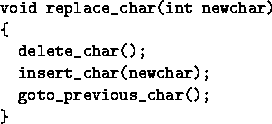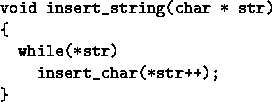
Removes the current character, does nothing at the end of file or if the buffer is empty. Obviously the buffer number of lines is updated if the current character was newline.
void replace_char(int newchar);
Replaces the current character by newchar. At the end of file or if the file is empty the new character is inserted at the current position and the buffer size is incremented. Obviously the number of lines of the buffer is updated if one of the current or the new character is newline. Its definition is equivalent to:

void insert_char(int newchar);
Inserts newchar before the current character and goes to the next position, therefore the current character remains the same. Obviously the number of lines of the buffer is updated if the inserted character is newline.
void insert_string(char * str);
Inserts all the str chars, except the final 0, as each character being inserted by insertchar:

int wprintf(char * format, ...);
wprintf is equivalent to printf except that the
output characters are inserted in the current window starting
at the current position. See also displaymessage
(§7.3.13 page ![]() ).
).
See also the following functions: globalreplace(),
(§7.3.5 page ![]() ), insertfile()
(§7.3.8 page
), insertfile()
(§7.3.8 page ![]() ),
readfile() (§7.3.8 page
),
readfile() (§7.3.8 page ![]() ) and
killcurrentbuffer()
(§7.3.8 page
) and
killcurrentbuffer()
(§7.3.8 page ![]() ).
).